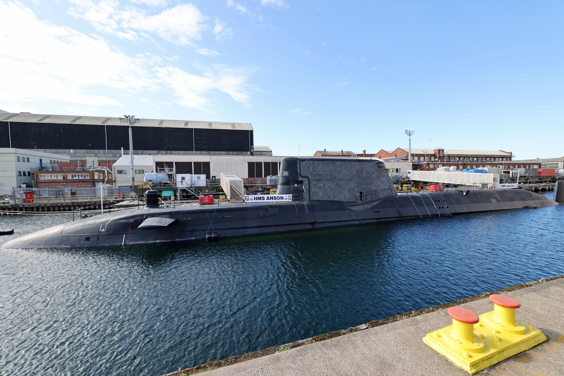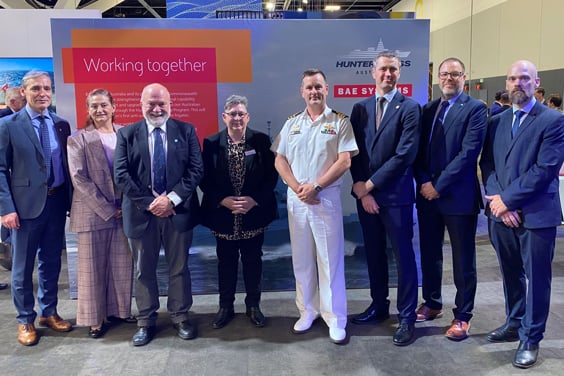Geopolitical tensions place unprecedented pressures on navies to extend the operational life and availability of fleets. According to Steve McDowall, LR’s Director for Naval Business Australasia, increasing defence budgets are driven by the two factors: deteriorating global security, and increasing needs to humanitarian and disaster relief crises. “Renewing aging naval fleets in addition to expanding naval forces are key in meeting these imperatives,” he says.
McDowall retired from the Royal Australian Navy (RAN) in 2016 after more than 38 years. He achieved star rank and held command and senior appointments at sea, ashore and internationally across operations, capability development, management and training for over 20 years.
He holds a Master’s degree in Strategic Studies, and is a graduate of the Australian Defence College and has extensive knowledge of enhancing operational availability and the maintenance of safety and seaworthiness of naval fleets. Since joining LR ‘s Australasian naval business in 2018 he has strengthened its naval presence across Australia.
His combined 47 plus years' experience, in addition to LR’s 265-year history supporting marine and naval leadership, means he is well-placed to address to challenges of modern navies. McDowall says navies must get it right, “for platforms that quickly corrode in seawater and salt laden air fundamentally challenges all involved from the strategic to the deck plate level.
“The unforgiving environment, naval platforms’ complexity and the unrelenting operational demands quickly expose any weakness in ship design, build and maintenance.”
The force multiplier effect
McDowall describes LR’s Naval Advisory services as ‘full spectrum’, covering everything from issue identification to new builds and in-service support programmes. He says this breadth of expertise delivers a “force multiplier” effect for navies managing complex, multi-stakeholder challenges.
“For example, when a naval vessel built in one country is retired, reactivated, and transferred to another navy, LR supports the process through classification and certification expertise,” he explains.
“LR has done this for the UK’s Type 22 and 23 frigates, New Zealand’s inshore patrol vessels, and the RAN’s conversion of a commercial tanker into the naval tanker HMAS SIRIUS.”
Drawing on his own experience with the Royal Navy and RAN, McDowall says LR’s independent technical advice was invaluable when he prepared and certified fleets for operations. “During my senior naval appointments, I quickly recognised of the value of LR’s advice when preparing, training and certifying the RAN’s surface combatant, amphibious and tanker fleets for operations. Appearing before Navy’s senior leaders involved significant responsibility, with the safety of my officers and sailors, the reputation of Australia’s Navy and my own career on the line.
“The independent advice and experience offered by LR significantly enhanced the quality of the guidance I was able to present to defence leadership on the efficacy of the Navy’s operating and maintenance processes,” he says.
One key example was LR’s role in advising an ex-USN Landing Platform Amphibious (LPA) ships, acquired after they had been retired from service. “LR’s advice in relation to these ships was unquestionably a decision support multiplier in how we risk managed those ships. This was crucial given their considerable age and incomplete records from their USN service,” he adds.
A trusted advisor
Now working at LR, McDowall has first-hand experience of the expertise available. “I have seen hundreds of years of accumulated knowledge and experience shared in advising and supporting navies, commercial marine and offshore industry leaders across diverse and complex enterprises and regulatory regimes.
“For the Australasian navy I have been privileged to join LR staff in developing and implementing guidance that accelerated ships out of deep maintenance and back into operational readiness, addressing profoundly complex technical challenges, evaluating new build and fleet modification designs and supporting the defence industry, its primes and supply chains in builds of new naval ship classes,” explains McDowall.
Since the early 2010s, the Australian and New Zealand defence sectors have relied on LR for ship classification, technical advisory services, and regulatory guidance. “For more than seven years I have seen the force multiplier effect of LR’s naval advice in helping the defence sector manage the CANBERRA Class LHDs, their light landing craft, and the landing ship dock HMAS CHOULES during intensive operational demands, maintenance periods and resolving complex technical issues.
“I have also seen the impact of LR’s advice delivered to the Royal Navy of New Zealand during the build, transition into and maintenance in service of its new tanker HMNZS AOTEAROA,” he says.
McDowall says LR has been a force multiplier in assisting the RAN, the Department of Defence’s Navy Shipbuilding and Sustainment Group and their industry partners in supporting propulsion system management and high precision propulsion alignment requirements.
LR has also been selected to assist Australia’s Department of Defence in certifying marine pollution prevention systems for its COLLINS Class submarines, reflecting the depth of advisory experience.
Meeting clients' needs
LR continues to play a key role supporting Australia’s ambitious Continuous Naval Shipbuilding plan. These include build yard readiness assessments, advice on regulatory system design options for unmanned vessels, design appraisals-in-principle and detailed design approvals, build compliance surveys and surveillance, supplier readiness and materials certification, and training services development and delivery.
“Current projects include partnering on programmes such as the HUNTER Class Frigate, the Australian Army’s new Landing Craft – Medium fleet, and the replacement for the sail training ship YOUNG ENDEAVOUR. Drawing on our knowledge and experiences with Royal Navy builds, such as the QUEEN ELIZABETH carriers, Type 45 destroyers and the Type 26 Frigates, and Australia’s CANBERRA Class LHD and SUPPLY Class tankers, we focus on applying the knowledge and expertise gained in these programmes to meet the needs of our defence clients and their partners,” says McDowall.
LR offers the best possible suite of naval advisory services in the world, says McDowall. “As a class society chosen by four of the world’s 5 Eyes Navies, and many other navies, LR continually strives for excellence in delivering comprehensive advice to defence departments and their navies in their building, maintenance and regulatory compliance of their fleets of today and tomorrow, and to support global security and help to those in humanitarian and disaster relief crises the world over.”









